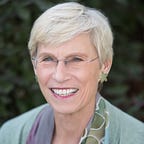Will Today’s Young Activists Become Their Generation’s Lifelong Advocates for Change?
This weekend, in Washington D.C. and across the US, hundreds of thousands of students accompanied by those who support them, stepped out of their classrooms and into history. Organizers estimate that as many as 800,000 people attended the March for Our Lives at the Capital, and that rallies took place in 390 of 435 Congressional districts. The size and potency of this youth-led protest against shamefully inadequate gun laws rival the student demonstrations of the Vietnam era.
With their remarkable media and organizing savvy, young activists are changing the gun debate and beginning to hold politicians accountable. But we believe they have even more potential: Our hope is that some of these young people will build on this passion for justice, and in the tradition of past activists, become the next generation of advocates who commit to work over the long term toward a more equal and humane America.
When we founded The Children’s Partnership in 1993, we were inspired by the spirit and galvanizing movements of the ’60s. In our work as advocates for children, we took to heart the values expressed by the leaders of the anti-war, civil rights, and women’s movements. We lobbied to give a core, underrepresented constituency a fair chance at a healthy, prosperous life. And over the course of our careers, we saw the passage of landmark legislation like the Earned Income Tax Credit, subsidies to schools and families for affordable high-speed Internet, as well as CHIP and the Affordable Care Act which provided the capstone to more than thirty years of pushing for universal health coverage for America’s children.
Our careers as advocates have been satisfying and personally meaningful because we have seen the needle move in a positive direction on the goals for children we focused upon.
As our country sits on the precipice of another time of great social upheaval, we see an opportunity to encourage and support a new generation of advocacy leaders.
The young people who are marching and organizing, bringing fresh faces and sophisticated digital literacy to activism are also being exposed to one of the most important types of work in our nation: a lifetime of advocacy for the values that undergird a more fair and inclusive society and a safe and clean environment for every person in America.
While in important ways young people are making activism their own, they are also stepping into a storied tradition of advocacy in the U.S. Leaders of earlier generations also took their outrage at injustice and turned it into reform agendas, policy proposals, and laws that made progress toward a more just society.
For example, Marian Wright Edelman, an iconic child advocate, started as an activist with the civil rights movement — including getting arrested in a 1960 sit-in. She went on to found the Children’s Defense Fund, as a voice for our most vulnerable children. Her work has helped pass laws to reduce child poverty and improve children’s health and nutrition, early child development, education, and youth outcomes.
Denis Hayes, the organizer of the first Earth Day in 1970, started as an anti-war activist before evolving into a leading advocate for the early environmental movement. He went on to take Earth Day international and is credited with building public knowledge and will for environmental causes.
Antonia Hernandez got her start as a civil rights leader picketing a grocery chain on behalf of farmworkers. Using her law degree as a vehicle for social change, she spent her career promoting immigration reform and voting rights, helping to write the Refugee Act of 1980. She continues to advance these values as President & CEO of California Community Foundation, one of the largest community foundations in the country.
It’s easy to imagine that among today’s energized, passionate young activists there is a Marian, Denis, and Antonia in the making. Leaders in politics, nonprofits, and philanthropy ought to invest in this new burgeoning cohort by providing training, mentoring, and funding to support this next generation of activists as they make their way in changing the world. We ought to listen closely to this next generation and help them make connections to the deep traditions of civic advocacy in the US.
Cameron Kasky, a Parkland student and one of the leaders of the #NeverAgain movement, told the crowd gathered in Washington on Saturday: “We hereby promise to fix the broken system we’ve been forced into and create a better world for the generations to come. Don’t worry, we’ve got this.”
His words may be prophetic: these young people are already making history and shaping the course of progress for all in America.
And we hope they are just getting started.
By Wendy Lazarus, Director and Laurie Lipper, Chief Consultant of Kids Impact Initiative (a Project of Community Partners). Founded in 2017, Kids Impact aims to support and strengthen existing advocacy for children by increasing accountability on issues that affect children’s well-being and helping develop the next generation of advocates.
WendyLazarusCA@gmail.com, LaurieALipper@gmail.com
